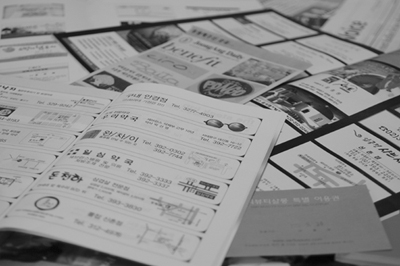
Most university students have attended a gaegang party, a get-together hosted by a student association or club to celebrate the beginning of a new semester. Although many of these student associations and clubs are subsidized by the school, when they hold events that require more money, they seek sponsors who can help them fund the event. Beauty shops, cafes and restaurants around campus are usually the subjects of this guest for sponsorship. In return, the student associations and clubs usually print the names of the sponsors in their brochures or on their banners. However, students’ behavior after they receive the sponsorship money is incurring censure from many sponsors.
Choi Mi-seon, the owner of the traditional bar Dong-hak, located in front of
Another person who owns a café in front of Ewha, who wants to remain anonymous, said, “Nowadays we can even receive a receipt when we donate 4,000 won at a welfare institution. When we sponsor students, we give them at least 30,000 won, but since none of the students visit us again, we have no idea how the money is being used.”
Naturally, the sponsors are curious about where their money is being used. “Students think that by sponsoring them, we can receive great effects from their advertisements, which is actually not true. All we want is a small word of appreciation from the students,” said the café owner.
Even some students admit that they rarely contact sponsors again. Kim Sou-eun (Voice, 3), vice-president of the Voice Department, said, “I had it in mind that I should visit the sponsors who helped us after our party, to express appreciation. But I eventually forgot about it because I was too busy holding the party.”
Such attitudes not only offend sponsors, but also hurt students from other clubs who are turned down by disappointed business owners. Hwang Hye-jin (Human Movement Studies, 3) was turned down by many shop owners when she was raising funds for the school soccer contest. “We visited a restaurant and asked the owner whether he would aid us financially. But the owner said that he does not sponsor anyone any more, after seeing students who just take the money for nothing,” said Hwang.
AISEC, a student federation that aims to foster world leaders, is famous for its well-organized procedures and rules when handling affairs, including finding sponsors. According to Choi Ha-na (Statistics, 2), the External Relationship Director of AISEC, when they look for a supporter, they first decide on appropriate sponsors by considering the characteristics and participants of their upcoming event. Since most of the events they organize are lectures for university students, they try to reach out to companies such as language institutes and cosmetic firms whose customers are university students. Then they directly call the company marketing directors and send them proposals which include specific details about the club and the event. “We take photos of banners and posters with the sponsors’ names and logos printed on them and also list the names of the participants who received souvenirs provided by the company,” said Choi. The AISEC members collect all their information and send a report to the sponsoring companies after the event.
“Although it seems like a mere trifle, it is a matter of building trust. If we give them a negative image, our juniors will have to face the trouble of dealing that image. If you keep a good relationship from the beginning, it might be helpful for your next event,” said Choi.
“All we want is a word of appreciation. Students should act more responsibly because this is also a part of social communication.”
caption: Student associations and clubs print the names and logos of their sponsors in brochures for their special events, in return for receiving financial aid.
Photo by Seo Yeon-ji

